Abstract
OBJECTIVE: To compare the efficacy of clozapine with typical antipsychotic drugs in controlling impulsivity and to explore the possible correlation of impulsivity with plasma 5-hydroxytryptamine (5-HT) levels, plasma 5-hydroxyindoleacetic acid (5-HIAA) levels and plasma 5-HT turnover. DESIGN: Prospective, cross-sectional study open to medication and blinded to biochemical analyses. PARTICIPANTS: Healthy control subjects (n = 24) and 46 inpatients and outpatients meeting the DSM-IV criteria for schizophrenia; 20 were being treated with clozapine and 26 were taking typical antipsychotic drugs. INTERVENTIONS: All psychotropic drugs other than clozapine or typical antipsychotic drugs were discontinued for at least 5 days and subjects fasted overnight before they were assessed. OUTCOME MEASURES: Coccaro Impulsivity Scale scores, plasma 5-HT levels, 5-HIAA levels and 5-HT turnover. RESULTS: Patients treated with clozapine and those treated with typical antipsychotics had significantly higher impulsivity scores than the control group, and the mean impulsivity score of the typical antipsychotic group was significantly higher than that of patients treated with clozapine. The mean concentration of 5-HT of the typical antipsychotic group was significantly lower than that of the control group and patients treated with clozapine; however, mean plasma levels of 5-HIAA were significantly higher for the clozapine group than the other 2 groups. 5-HT turnover was significantly higher for the 2 drug-treatment groups than for the control group. CONCLUSIONS: These results suggest that treatment with clozapine should be considered for patients with schizophrenia who are impulsive and aggressive.
Full text
PDF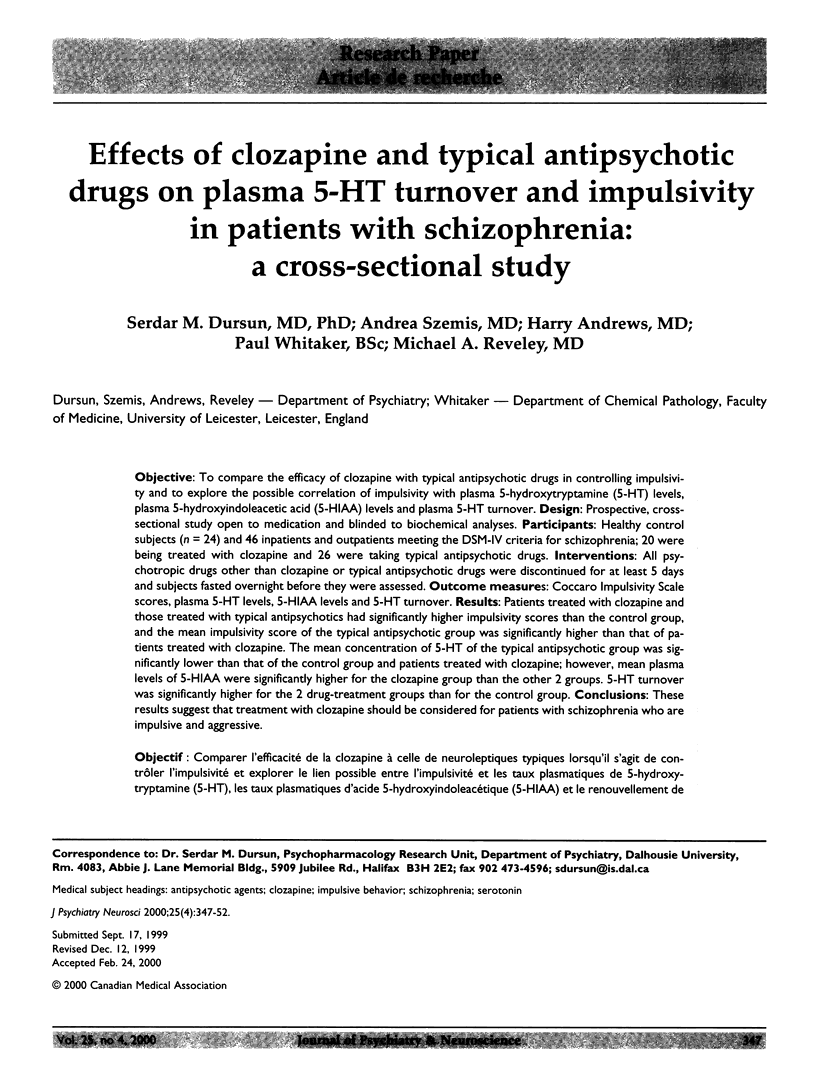
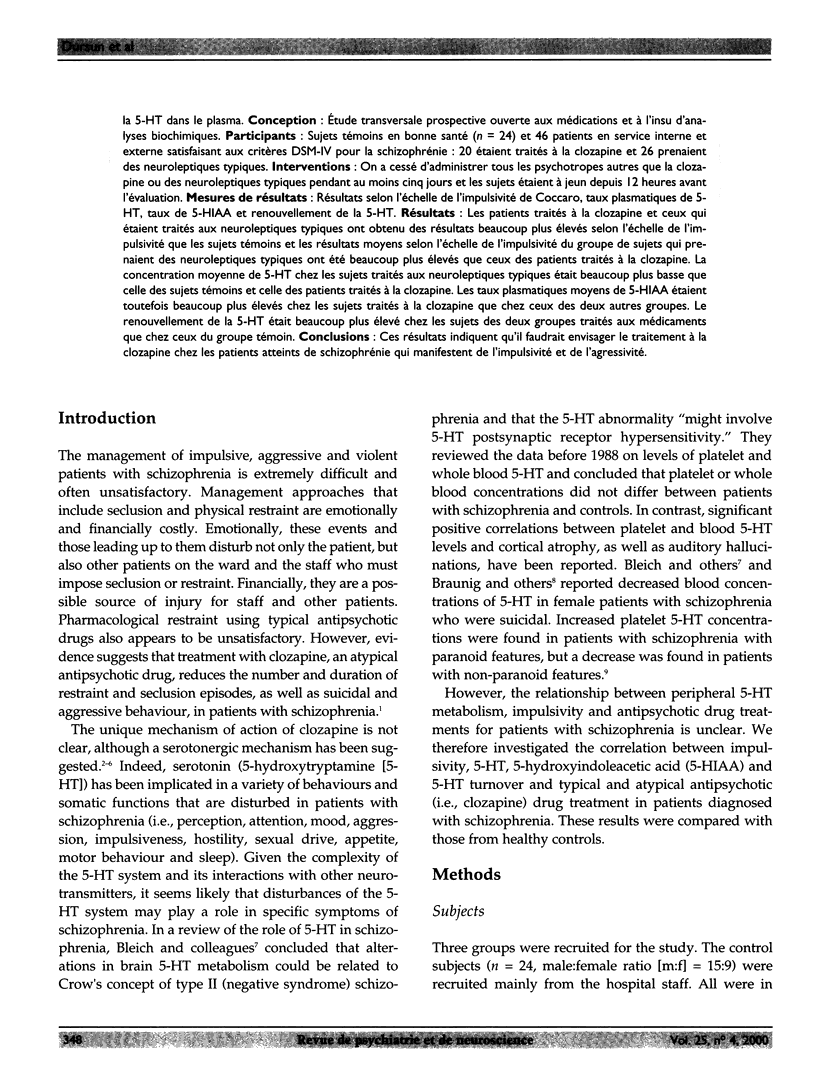
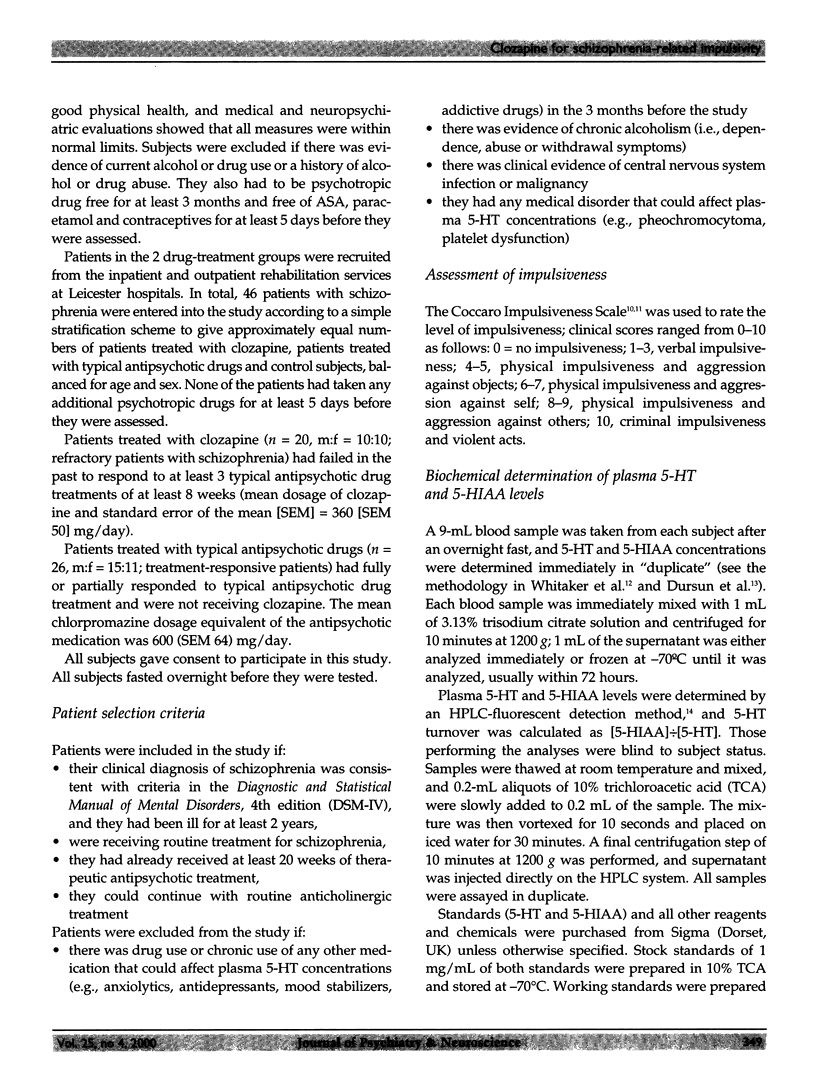
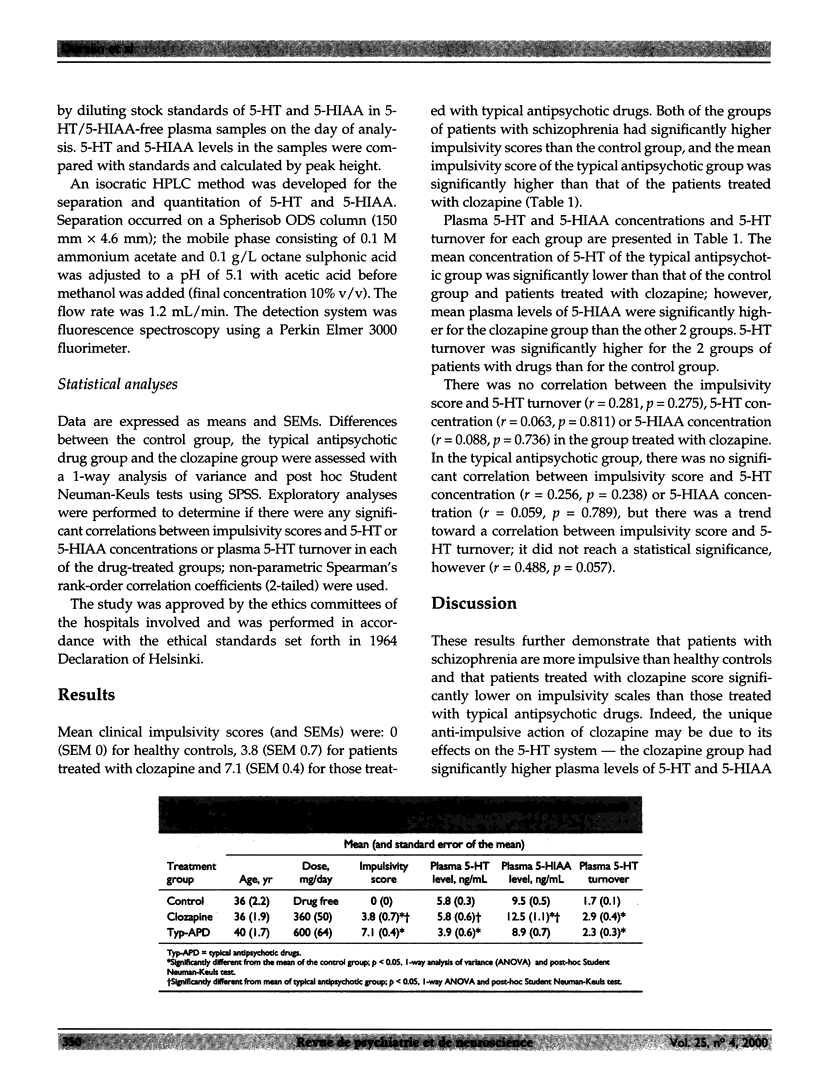
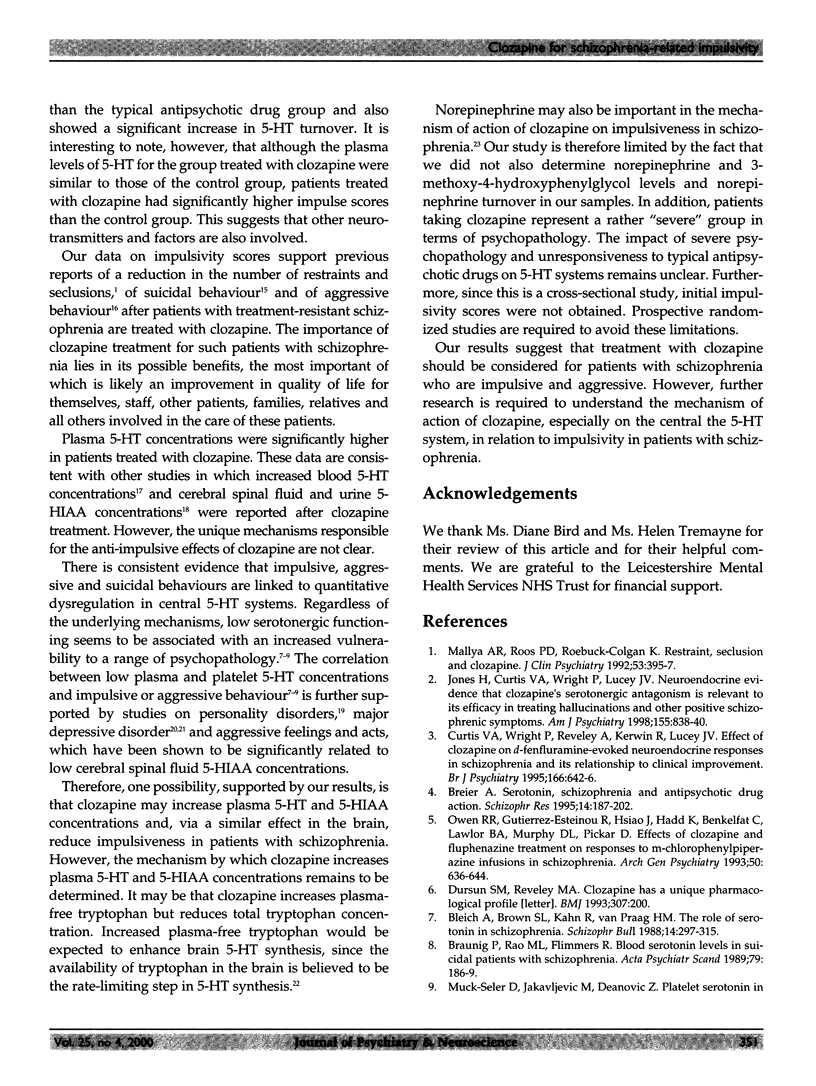
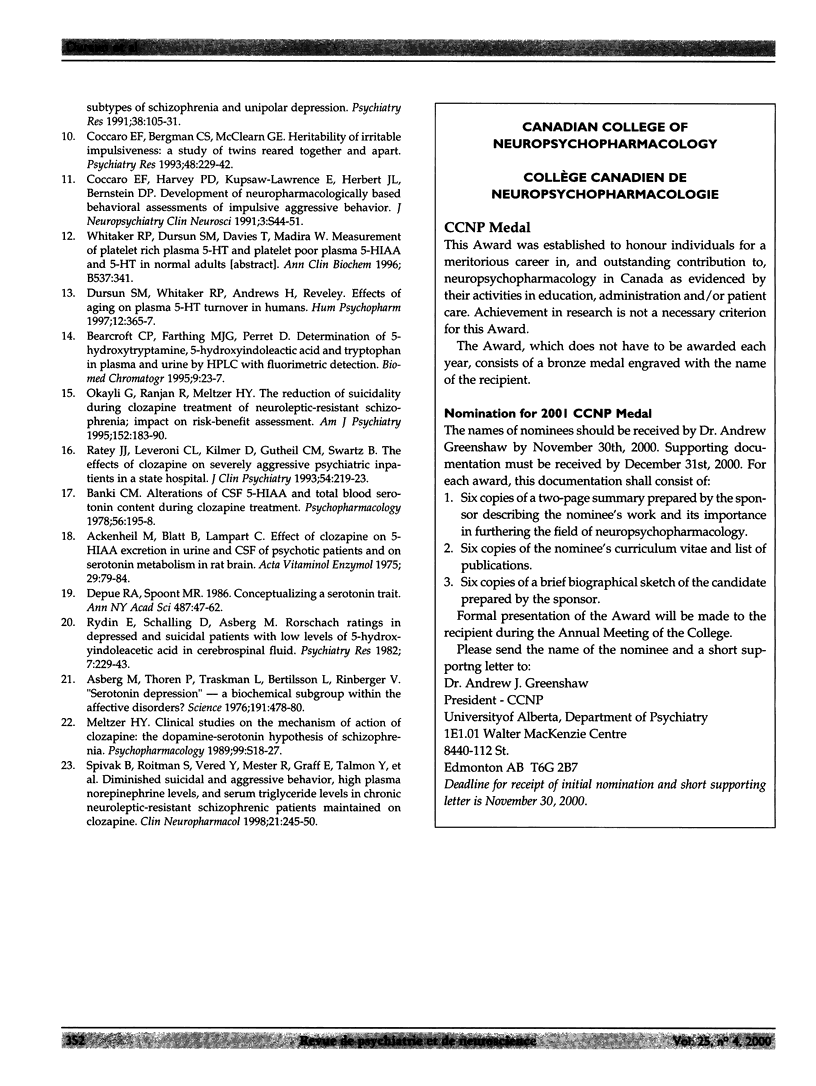
Selected References
These references are in PubMed. This may not be the complete list of references from this article.
- Ackenheil M., Blatt B., Lampart C. Effect of clozapine on 5-HIAA excretion in urine and CSF of psychotic patients and on serotonin metabolism in rat brain. Acta Vitaminol Enzymol. 1975;29(1-6):79–84. [PubMed] [Google Scholar]
- Asberg M., Thorén P., Träskman L., Bertilsson L., Ringberger V. "Serotonin depression"--a biochemical subgroup within the affective disorders? Science. 1976 Feb 6;191(4226):478–480. doi: 10.1126/science.1246632. [DOI] [PubMed] [Google Scholar]
- Banki C. M. Alterations of cerebrospinal fluid 5-hydroxyindoleacetic acid, and total blood serotonin content during clozapine treatment. Psychopharmacology (Berl) 1978 Mar 1;56(2):195–198. doi: 10.1007/BF00431849. [DOI] [PubMed] [Google Scholar]
- Bearcroft C. P., Farthing M. J., Perrett D. Determination of 5-hydroxytryptamine, 5-hydroxyindoleacetic acid and tryptophan in plasma and urine by HPLC with fluorimetric detection. Biomed Chromatogr. 1995 Jan-Feb;9(1):23–27. doi: 10.1002/bmc.1130090105. [DOI] [PubMed] [Google Scholar]
- Bleich A., Brown S. L., Kahn R., van Praag H. M. The role of serotonin in schizophrenia. Schizophr Bull. 1988;14(2):297–315. doi: 10.1093/schbul/14.2.297. [DOI] [PubMed] [Google Scholar]
- Breier A. Serotonin, schizophrenia and antipsychotic drug action. Schizophr Res. 1995 Feb;14(3):187–202. doi: 10.1016/0920-9964(94)00043-8. [DOI] [PubMed] [Google Scholar]
- Bråunig P., Rao M. L., Fimmers R. Blood serotonin levels in suicidal schizophrenic patients. Acta Psychiatr Scand. 1989 Feb;79(2):186–189. doi: 10.1111/j.1600-0447.1989.tb08586.x. [DOI] [PubMed] [Google Scholar]
- Coccaro E. F., Bergeman C. S., McClearn G. E. Heritability of irritable impulsiveness: a study of twins reared together and apart. Psychiatry Res. 1993 Sep;48(3):229–242. doi: 10.1016/0165-1781(93)90074-q. [DOI] [PubMed] [Google Scholar]
- Coccaro E. F., Harvey P. D., Kupsaw-Lawrence E., Herbert J. L., Bernstein D. P. Development of neuropharmacologically based behavioral assessments of impulsive aggressive behavior. J Neuropsychiatry Clin Neurosci. 1991 Spring;3(2):S44–S51. [PubMed] [Google Scholar]
- Curtis V. A., Wright P., Reveley A., Kerwin R., Lucey J. V. Effect of clozapine on d-fenfluramine-evoked neuroendocrine responses in schizophrenia and its relationship to clinical improvement. Br J Psychiatry. 1995 May;166(5):642–646. doi: 10.1192/bjp.166.5.642. [DOI] [PubMed] [Google Scholar]
- Depue R. A., Spoont M. R. Conceptualizing a serotonin trait. A behavioral dimension of constraint. Ann N Y Acad Sci. 1986;487:47–62. doi: 10.1111/j.1749-6632.1986.tb27885.x. [DOI] [PubMed] [Google Scholar]
- Dursun S. M., Reveley M. A. Clozapine in the management of schizophrenia. Clozapine has unique pharmacological profile. BMJ. 1993 Jul 17;307(6897):200–200. doi: 10.1136/bmj.307.6897.200. [DOI] [PMC free article] [PubMed] [Google Scholar]
- Jones H., Curtis V. A., Wright P., Lucey J. V. Neuroendocrine evidence that clozapine's serotonergic antagonism is relevant to its efficacy in treating hallucinations and other positive schizophrenic symptoms. Am J Psychiatry. 1998 Jun;155(6):838–840. doi: 10.1176/ajp.155.6.838. [DOI] [PubMed] [Google Scholar]
- Mallya A. R., Roos P. D., Roebuck-Colgan K. Restraint, seclusion, and clozapine. J Clin Psychiatry. 1992 Nov;53(11):395–397. [PubMed] [Google Scholar]
- Meltzer H. Y. Clinical studies on the mechanism of action of clozapine: the dopamine-serotonin hypothesis of schizophrenia. Psychopharmacology (Berl) 1989;99 (Suppl):S18–S27. doi: 10.1007/BF00442554. [DOI] [PubMed] [Google Scholar]
- Meltzer H. Y., Okayli G. Reduction of suicidality during clozapine treatment of neuroleptic-resistant schizophrenia: impact on risk-benefit assessment. Am J Psychiatry. 1995 Feb;152(2):183–190. doi: 10.1176/ajp.152.2.183. [DOI] [PubMed] [Google Scholar]
- Mück-Seler D., Jakovljević M., Deanović Z. Platelet serotonin in subtypes of schizophrenia and unipolar depression. Psychiatry Res. 1991 Aug;38(2):105–113. doi: 10.1016/0165-1781(91)90036-o. [DOI] [PubMed] [Google Scholar]
- Owen R. R., Jr, Gutierrez-Esteinou R., Hsiao J., Hadd K., Benkelfat C., Lawlor B. A., Murphy D. L., Pickar D. Effects of clozapine and fluphenazine treatment on responses to m-chlorophenylpiperazine infusions in schizophrenia. Arch Gen Psychiatry. 1993 Aug;50(8):636–644. doi: 10.1001/archpsyc.1993.01820200046005. [DOI] [PubMed] [Google Scholar]
- Ratey J. J., Leveroni C., Kilmer D., Gutheil C., Swartz B. The effects of clozapine on severely aggressive psychiatric inpatients in a state hospital. J Clin Psychiatry. 1993 Jun;54(6):219–223. [PubMed] [Google Scholar]
- Rydin E., Schalling D., Asberg M. Rorschach ratings in depressed and suicidal patients with low levels of 5-hydroxyindoleacetic acid in cerebrospinal fluid. Psychiatry Res. 1982 Oct;7(2):229–243. doi: 10.1016/0165-1781(92)90096-l. [DOI] [PubMed] [Google Scholar]
- Spivak B., Roitman S., Vered Y., Mester R., Graff E., Talmon Y., Guy N., Gonen N., Weizman A. Diminished suicidal and aggressive behavior, high plasma norepinephrine levels, and serum triglyceride levels in chronic neuroleptic-resistant schizophrenic patients maintained on clozapine. Clin Neuropharmacol. 1998 Jul-Aug;21(4):245–250. [PubMed] [Google Scholar]


